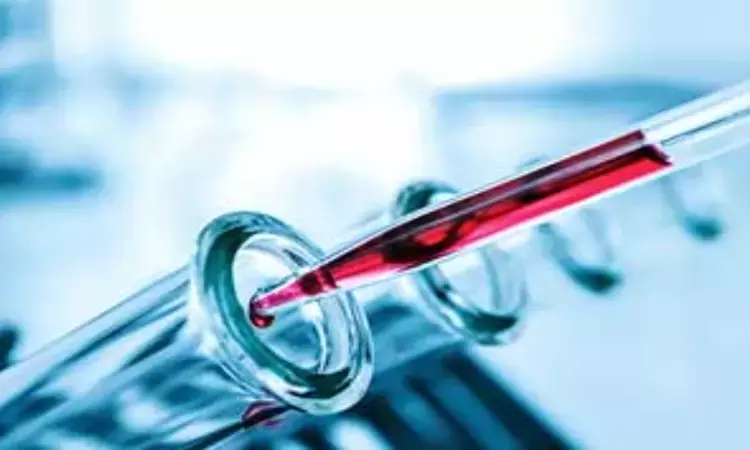- Home
- Medical news & Guidelines
- Anesthesiology
- Cardiology and CTVS
- Critical Care
- Dentistry
- Dermatology
- Diabetes and Endocrinology
- ENT
- Gastroenterology
- Medicine
- Nephrology
- Neurology
- Obstretics-Gynaecology
- Oncology
- Ophthalmology
- Orthopaedics
- Pediatrics-Neonatology
- Psychiatry
- Pulmonology
- Radiology
- Surgery
- Urology
- Laboratory Medicine
- Diet
- Nursing
- Paramedical
- Physiotherapy
- Health news
- Fact Check
- Bone Health Fact Check
- Brain Health Fact Check
- Cancer Related Fact Check
- Child Care Fact Check
- Dental and oral health fact check
- Diabetes and metabolic health fact check
- Diet and Nutrition Fact Check
- Eye and ENT Care Fact Check
- Fitness fact check
- Gut health fact check
- Heart health fact check
- Kidney health fact check
- Medical education fact check
- Men's health fact check
- Respiratory fact check
- Skin and hair care fact check
- Vaccine and Immunization fact check
- Women's health fact check
- AYUSH
- State News
- Andaman and Nicobar Islands
- Andhra Pradesh
- Arunachal Pradesh
- Assam
- Bihar
- Chandigarh
- Chattisgarh
- Dadra and Nagar Haveli
- Daman and Diu
- Delhi
- Goa
- Gujarat
- Haryana
- Himachal Pradesh
- Jammu & Kashmir
- Jharkhand
- Karnataka
- Kerala
- Ladakh
- Lakshadweep
- Madhya Pradesh
- Maharashtra
- Manipur
- Meghalaya
- Mizoram
- Nagaland
- Odisha
- Puducherry
- Punjab
- Rajasthan
- Sikkim
- Tamil Nadu
- Telangana
- Tripura
- Uttar Pradesh
- Uttrakhand
- West Bengal
- Medical Education
- Industry
Will higher Selenium status prevent Cancer risk?

According to a new study, having a high selenium level may not prevent the development of cancer. The links between kidney cancer and multiple myeloma must be confirmed in well-powered investigations.
As the evidence for a link between selenium and cancer risk is ambiguous, this study was conducted by Shuai Yuan and team with the objective to investigate the links between selenium levels and 22 different types of cancer, as well as any cancer.
The findings of this study were published in the International Journal of Cancer on 15 December, 2021.
For this study, as instrumental variables, single nucleotide polymorphisms highly related with toenail and blood (TAB) and blood selenium levels in mild linkage disequilibrium (r2 0.3) were utilized. The UK Biobank was used to obtain genetic correlations of selenium-associated single nucleotide polymorphisms with cancer, which included 59,647 cancer cases and 307,914 controls. Associations with p0.1 in the UK Biobank were evaluated for replication in the FinnGen collaboration, which included over 180,000 people. The relationships were estimated using the inverse-variance weighted technique, which accounts for linkage disequilibrium.
The results stated as follow:
1. TAB selenium levels predicted by genetics were not linked with the risk of the 22 site-specific malignancies or any cancer (all 22 site-specific cancers).
2. Similarly, there was no meaningful correlation found between genetically predicted blood selenium levels.
3. However, genetically predicted blood selenium levels were associated with an increased risk of kidney cancer (odds ratio (OR) per one-unit rise in log-transformed levels, 0.83, 95% CI, 0.67-1.03) and multiple myeloma (OR, 1.40, 95% CI, 1.02-1.93).
4. FinnGen found the same direction of connection for kidney cancer but not for multiple myeloma.
5. The OR of kidney cancer in the UK Biobank and FinnGen meta-analysis was 0.83. (95 % CI, 0.69-1.00).
In conclusion, overall findings suggest no preventive effect of high selenium status against cancer development.
Reference:
Yuan S, Mason AM, Carter P, Vithayathil M, Kar S, Burgess S, Larsson SC. Selenium and cancer risk: wide-angled Mendelian randomization analysis. Int J Cancer. 2021 Dec 15. doi: 10.1002/ijc.33902. Epub ahead of print. PMID: 34910310.
Medical Dialogues consists of a team of passionate medical/scientific writers, led by doctors and healthcare researchers. Our team efforts to bring you updated and timely news about the important happenings of the medical and healthcare sector. Our editorial team can be reached at editorial@medicaldialogues.in.
Dr Kamal Kant Kohli-MBBS, DTCD- a chest specialist with more than 30 years of practice and a flair for writing clinical articles, Dr Kamal Kant Kohli joined Medical Dialogues as a Chief Editor of Medical News. Besides writing articles, as an editor, he proofreads and verifies all the medical content published on Medical Dialogues including those coming from journals, studies,medical conferences,guidelines etc. Email: drkohli@medicaldialogues.in. Contact no. 011-43720751


